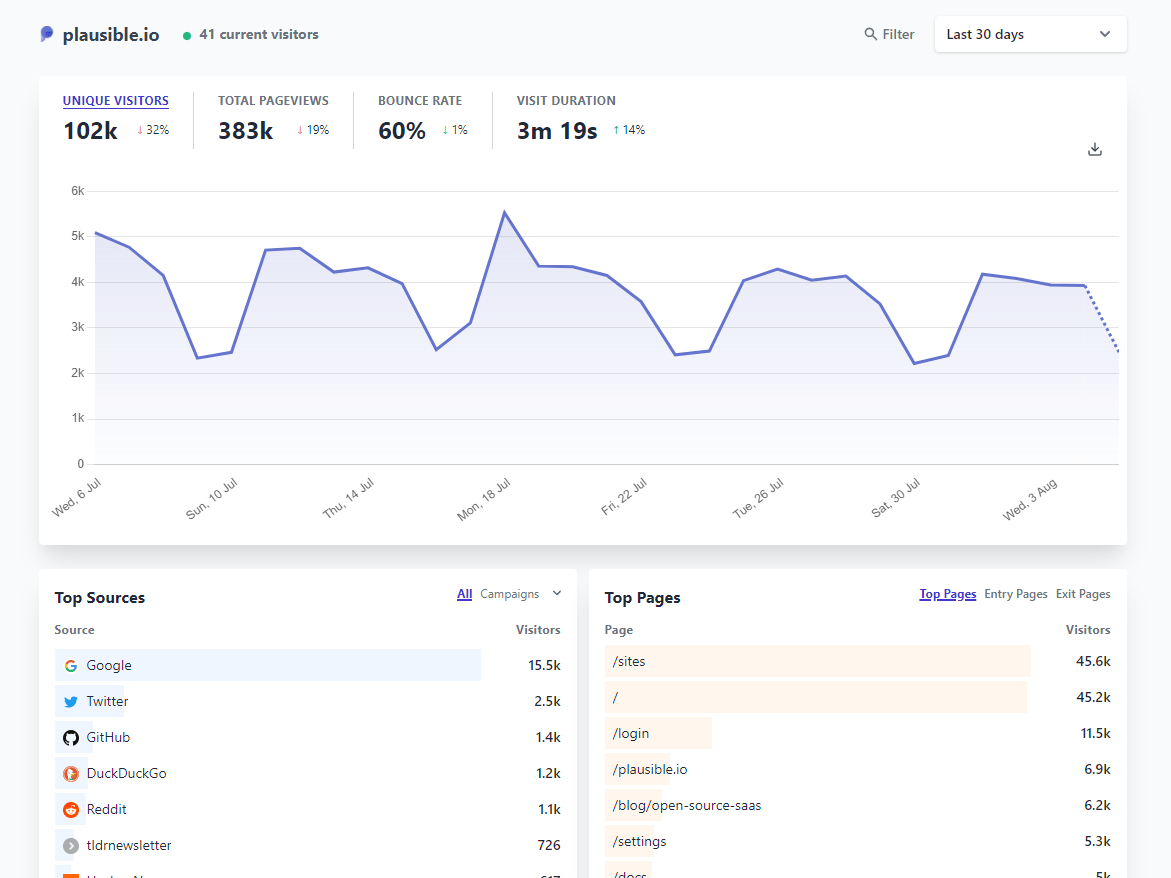
Simple web analytics tools such as Simple Analytics, Fathom or Plausible (image above) provide basic website analytics data in an easy-to-understand manner. This concept may seem attractive, however for many, these tools will not be useful, or even make more harm than good.
This article is based on episode 8 of our podcast – the Growth Detectives show. Listen to other episodes.
Let’s talk about it.
What makes a simple web analytics tool
In my view, simple web analytics tools have 3 qualities:
- Limited data tracking: They can track only basic website metrics such as number of visitors, bounce rate, top pages, traffic sources, and sometimes goals or events. This data is most often considered “vanity metrics”, because they are (in most cases) useless, without proper segmentation (more on that below)
- Single-page dashboards: This is more of a presentation thing, but I found it to be true with all simple analytics tools.
- Limited data filtering and/or segmentation options: They offer few options for segmenting or filtering the data (if any).
Why simple web analytics tools are not wort it (most of the time)
In comparison to the “big boys” tools like Google Analytics, simple tools have 3, very serious disadvantages:
- They track only basic metrics, which may not provide enough insights for more complex websites and serious businesses.
- Without cookies, these tools may not accurately track returning visitors.
- And finally and most importantly – limited segmentation and filtering options will, in most cases, stop you from learning the roots of your problems on the website.
It all looks and sounds very serious, however there are also some good sides of simple web analytics tools.
Why would you want to use simple web analytics tools?
Simple analytics tools have a few advantages which make them surprisingly suitable for specific groups of users. These advantages are…
- Ease of use: They are designed to be easy to set up and use, even for users with no prior experience in web analytics.
- Privacy-focus: Simple web analytics tools often don’t use cookies to track visitors. This means that they do not require the use of a cookie notice, and, as a result…
- More traffic is tracked: people have no way to opt-out from tracking because none of their personally identifiable information is tracked.
Who are simple web analytics tools for?
Considering all of the above, simple web analytics tools are a good choice for:
- People with non-profit or very new websites. In these cases, the metrics that these tools provide are not used to improve the website but have motivational effect on the site owners.
- Owners of sites with affiliate links or a lot of ads: In case of these websites, the vanity metrics tracked by simple analytics tools cover most of the important KPIs. And, if the analytics tool they use is set up to also track clicks in tracking affiliate clicks and ads, then they need nothing more.
- CEOs who need a quick overview of website performance: Simple web analytics tools can give them a quick and easy way to track key performance indicators (KPIs) – of course, if they are properly tracked.
- Simple Ecommerce sites (with small number of products). Only providing that the important conversions are tracked.
Attention. In the last points 2-4, the simple analytics tools must be set up to track clicks in links or KPIs. In most cases this needs to be done manually by a developer or set up in a plugin like our WP Full Picture for WordPress and WooCommerce.
When are simple web analytics tools not recommended?
Simple web analytics tools may not be suitable for:
- Medium and large ecommerce websites. These sites often require more advanced analytics to track sales, conversions, and customer behaviour.
- Specialized websites: Websites with unique metrics or complex user journeys.
- Business websites beyond the early stages: As businesses grow and their needs for analytics become more sophisticated, simple web analytics tools may be… too simple.
In conclusion, simple web analytics tools can be a valuable tool for website owners who need a quick and easy way to track basic website performance. However, for more complex analysis and deeper insights, more advanced analytics tools may be better suited.
